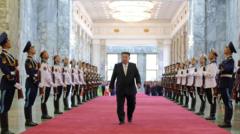Why Did a Plane with South Korean Workers Get Detained in the US Before Landing in Incheon?

Published: 2025-09-12 06:38:38 | Category: policy GNEWS Search
A chartered plane has brought home around 300 South Koreans who were detained in a significant US immigration raid at a battery project site. Their release followed intense diplomatic negotiations, highlighting ongoing challenges surrounding visa regulations for foreign workers in the US. This incident underscores the need for a more streamlined visa process for skilled workers from South Korea and other nations.
Last updated: 12 September 2023 (BST)
Key Takeaways
- 300 South Koreans detained in a US immigration raid have returned home.
- The raid raised concerns over visa regulations for foreign workers.
- Discussions are underway for a new visa type to facilitate worker mobility.
- Other nationals, including Chinese, Japanese, and Indonesian workers, were also affected.
- Intense diplomatic negotiations were crucial in securing their release.
The Incident: A Closer Look
The recent immigration raid in the United States, which led to the detention of South Korean workers, has sparked outrage and concern back in South Korea. This incident unfolded at a battery project site, a critical area of investment and development aimed at enhancing the global supply chain for electric vehicles (EVs).
Reports indicate that the workers were taken into custody while in handcuffs and shackles, an action that shocked many in South Korea, where such treatment of citizens abroad is generally viewed as unacceptable. The South Korean government quickly mobilised to negotiate their release, showcasing the importance of these workers to the nation’s economy and the broader geopolitical relationship with the United States.
Implications for South Korean Workers
This incident has brought to light the ongoing struggles of South Korean businesses in securing proper visas for specialist workers. Many companies in South Korea rely on skilled foreign labour to fulfil project requirements, particularly in high-demand sectors such as technology and renewable energy.
Currently, the existing US visa framework often leaves room for confusion and misinterpretation, leading workers to navigate grey areas in visa enforcement. This complexity has made it increasingly challenging for businesses to bring in the necessary talent for extended periods, which is vital for project completion.
Diplomatic Response and Future Prospects
In response to the immigration raid, South Korea's Foreign Minister visited Washington to discuss the situation and explore potential solutions. One of the key outcomes of these talks was the suggestion to establish a joint working group focused on creating a new type of visa specifically for Korean workers.
This proposed visa would aim to simplify the application process and provide clearer guidelines for both employers and workers. Establishing a dedicated visa category could significantly alleviate the challenges faced by South Korean businesses and enhance bilateral relations between the US and South Korea.
The Broader Context
The detention of South Korean workers is not an isolated incident. It reflects a wider trend in which foreign workers face increasing scrutiny and regulation in various sectors across the United States. This scrutiny is often driven by concerns over immigration policies and national security.
As countries compete for skilled labour, it is essential for governments to strike a balance between enforcing immigration laws and fostering an environment that encourages foreign investment and collaboration. The situation is particularly pressing in industries like renewable energy and technology, where skilled labour shortages are prevalent.
Looking Ahead: What Happens Next?
The successful return of the detained South Korean workers marks a critical moment in the ongoing dialogue between the US and South Korea. As both countries consider new measures to facilitate worker mobility, it remains to be seen how effectively these changes can be implemented.
In the coming months, businesses and government officials will need to monitor the progress of discussions surrounding the new visa type. Stakeholders from various sectors will be keen to see how these changes could impact future project timelines and overall labour availability.
Conclusion
The recent immigration raid has highlighted significant challenges faced by South Korean workers in the US, but it has also opened the door for potential reforms that could benefit both nations. As discussions continue, it is crucial for all parties involved to work collaboratively towards solutions that not only address immediate concerns but also foster long-term cooperation in the global economy.
How will the proposed visa changes reshape the landscape for South Korean workers in the US? This pivotal moment could set a precedent for future international labour relations in a rapidly evolving global market. #SouthKorea #USImmigration #WorkVisaReform
FAQs
What led to the detention of South Korean workers in the US?
The workers were detained during a US immigration raid at a battery project site, which raised concerns over visa regulations and enforcement for foreign nationals.
How many workers were affected by the immigration raid?
Approximately 300 South Korean workers were detained, along with 10 workers from China, three from Japan, and one from Indonesia, highlighting the incident's broader impact.
What is the South Korean government's response to the incident?
The South Korean government has engaged in intense negotiations to secure the release of the detained workers, and discussions are ongoing to establish a new visa category for Korean nationals.
Why is a new visa type being considered for South Korean workers?
A new visa type is being proposed to simplify the process for South Korean businesses to bring in skilled workers, addressing ongoing challenges with the current US visa system.
What are the implications of this incident for future US-South Korea relations?
This incident could lead to improved diplomatic relations, with potential reforms in visa policies that facilitate greater worker mobility and collaboration in key sectors.



